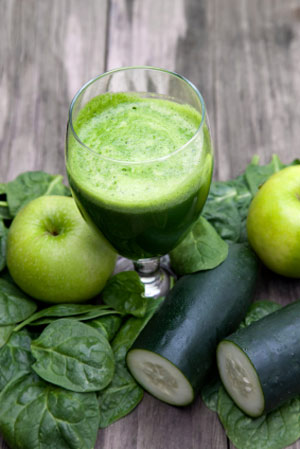|
Do detox diets work? 
If your holiday diet consisted of eating too many heavily processed and artificial foods, you may be thinking about adopting a “detox” this new year. With an ultimate goal of purging the body of harmful 21st century toxins — food additives, pesticides, pollutants, and other synthetic compounds — and with glowing promises of increased energy, clearer skin, headache relief, decreased bloating, and perhaps even weight loss, detoxing sounds like an ideal solution. But does it really work? Do these regimens safely help the body rid toxins better than the normal metabolic processes of the liver, kidney, skin, lymph nodes, and other bodily systems? The Basic Ingredients of a Detox Diet All detox diets are some combination of fasting, food restriction and supplementation. They typically begin with a “cleansing phase,” which is typically two or three days of only liquids. Brown rice, fruit, and steamed vegetables are added until about a week later when other foods — except red meat, wheat, sugar, eggs, and prepackaged foods — may be reintroduced. This final phase is expected to be followed indefinitely for maintenance. Of course, with no standard definition of a “detox diet,” programs vary considerably. Most include elimination of caffeine, nicotine and alcohol, and many restrict meat and solid foods altogether. The diets also tend to involve consumption of large amounts of liquid, fiber, and raw vegetables — ingredients that are thought to purge the gastrointestinal system of accumulated harmful substances. A variety of “cleansing boosters” may be incorporated — herbal laxatives, “colonics” (aka enema, a flushing out of the rectum and colon with water), probiotics to repopulate the natural intestinal flora, and antioxidants. Some programs even include relaxation therapy, such as massage, sauna, aromatherapy baths, deep-breathing exercises, and walking. The (Lack of) Science Behind Detox Diets No evidence supports that harmful chemicals accumulate in the body (in fact, the liver and kidneys are pretty good at getting rid of bodily toxins). And even if toxins did accumulate in the body, there’s no reason to believe that these detox diets would get rid of them. Toxicologists A. Jay Gandolfi, an associate dean for research in the college of pharmacy at the University of Arizona, and Linda Birnbaum, director of the experimental toxicology division of the Environmental Protection Agency made the following points in a LA Times article: - high volumes of liquid consumption could theoretically help remove water-soluble chemicals like arsenic, but not fat-soluble chemicals (which make up most pollutants)
- fiber consumption may help eliminate toxic chemicals that accumulate in the liver, but not chemicals that are located in other parts of the gastrointestinal system
- raw vegetables have no special detoxifying properties other than that their high fiber content can further help bulk up stools
- most chemicals of concern are fat-soluble and so are stored in fat. The best way to get rid of these potential toxins is not through a detox diet, but through weight loss. Slender people get rid of toxins more quickly than overweight and obese individuals.
Possible Dangers While consuming a lot of fiber and staying hydrated are healthy when done in moderation, using colonics and laxatives that are intended to “purify” the digestive tract are dangerous. Their use can lead to metabolic disturbances, fainting episodes, dehydration, and muscle cramps, among other complications. The more extreme programs also leave individuals protein- and nutrient-depleted. Among other consequences, this can lead to decreased lean muscle mass and slowed metabolism. But What About the Great Benefits Countless Detox Followers Pronounce? Benefits may exist, but they likely are not due to detoxification. The decreased bloating is likely from eating less food; the clearer skin from increasedhydration; and the decreased headaches exercise and relaxation components of the program, and psychological factors. That’s not to say all forms of detox diets should be strictly avoided. In fact, there may be some benefit in a short-term (1-3 days) laxative-free “detox” program, but not for its purification. As a health-promoting practice, committing to a detox regimen helps people stop and consider the healthy and unhealthy components of their lifestyles, and make changes — eating less, examining health habits, and getting rid of the junk like processed foods, nicotine, caffeine, and alcohol. Some dietitians even recommend a “gentle cleanse” to clients. That is, a healthy dietconsisting of primarily fruits, vegetables, non-meat proteins, and lots of water while excluding substances such as nicotine, caffeine, and alcohol. In the end, a short and moderate “detox” regimen (free of additional supplements, laxatives, and colonics) may serve as an incentive to improve a chronically unhealthy lifestyle, though remember, it does not purify or cleanse the body of toxins.
 该贴已经同步到 jacky的微博 该贴已经同步到 jacky的微博 |  |小黑屋|手机版Mobile|体能论坛
( 粤ICP备15092216号-2 )
|小黑屋|手机版Mobile|体能论坛
( 粤ICP备15092216号-2 )